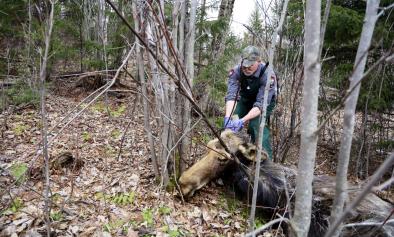Science Source
Marine heat wave and multiple stressors tip bull kelp forest to sea urchin barrens
- States that climatic events have recently impacted marine ecosystems around the world, including foundation species such as corals and kelps
- Describes the rapid climate-driven catastrophic shift in 2014 from a previously robust kelp forest to unproductive large scale urchin barrens in northern California
- Finds that bull kelp canopy was reduced by >90% along more than 350 km of coastline
- Twenty years of kelp ecosystem surveys reveal the timing and magnitude of events, including mass mortalities of sea stars (2013-), intense ocean warming (2014–2017), and sea urchin barrens (2015-)
- Multiple stressors led to the unprecedented and long-lasting decline of the kelp forest
- Kelp deforestation triggered mass (80%) abalone mortality (2017) resulting in the closure in 2018 of the recreational abalone fishery worth an estimated $44 M and the collapse of the north coast commercial red sea urchin fishery (2015-) worth $3 M
- Key questions remain such as the relative roles of ocean warming and sea star disease in the massive purple sea urchin population increase
- Concludes that science and policy will need to partner to better understand drivers, build climate-resilient fisheries and kelp forest recovery strategies in order to restore essential kelp forest ecosystem services
Related Content
Science Source
| Global Change Biology
Decadal-scale phenology and seasonal climate drivers of migratory baleen whales in a rapidly warming marine ecosystem
Daniel E. Pendleton, Morgan W. Tingley, Laura C. Ganley et al
Headline

May 19, 2022 | Climate Nexus Hot News
Climate Change Great For Winter Ticks, Very Bad For Moose Calves
Science Source
Climate change increases cross-species viral transmission risk
Colin J. Carlson, Gregory F. Albery, Cory Merow et al
Science Source
| Journal of Animal Ecology
Climate change affects bird nesting phenology: Comparing contemporary field and historical museum nesting records
John M. Bates, Mason Fidino, Laurel Nowak-Boyd et al


